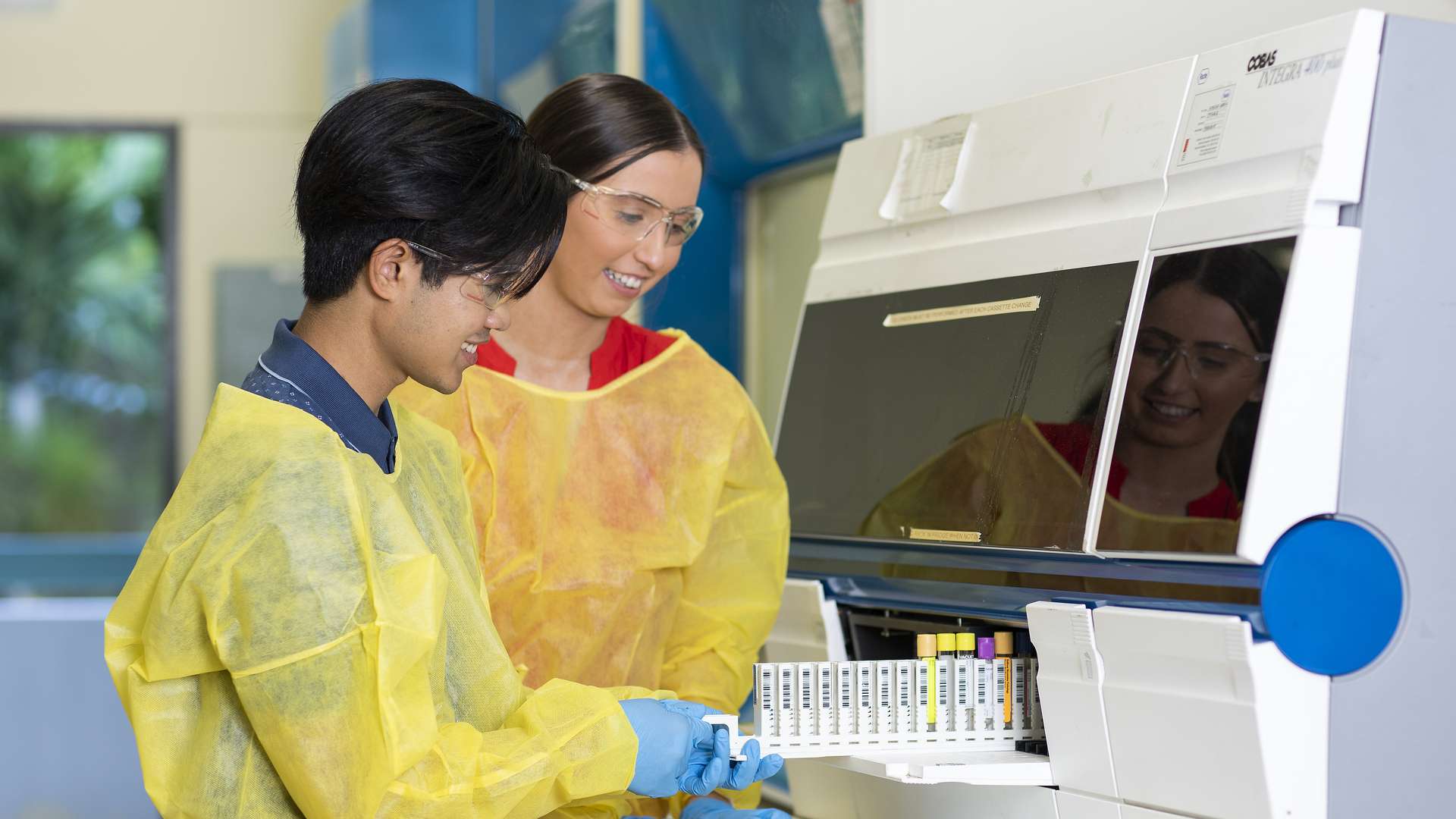
Explore health and disease issues and equip yourself with practical skills by studying the Bachelor of Medical Science. This course will prepare you to undertake best practices in patient testing, developing therapeutics, monitoring disease and sharing knowledge in the medical biotechnology or pharmaceutical industry. Benefit from the flexibility to tailor this degree to suit your career goals with a choice of majors in clinical measurement, nutrition, pathology or biotechnology.
The Bachelor of Medical Science aims to develop your skills to apply Clinical Physiology knowledge to clinical practice in a health professional role or Biotechnology in support industries and medical research.
The course is designed to build a high level of technical and evaluative skill so you can assess and implement recommendations for best practices in patient testing, monitoring and education or develop therapeutics in the cutting-edge medical biotechnology or pharmaceutical industry. The course also aims to develop high-level communication skills to interact positively with patients/clients, other health professionals, or industry leaders and be ready for the clinical or scientific work environment.
Clinical decision-making and problem-solving abilities will be promoted through opportunities such as developing designing, conducting and interpreting medical research skills.
The practical learning opportunities such as lab work and placements, solidified my understanding of the theoretical teachings. This honed vital skills and reinforced my ambition to pursue a career as a medical scientist.
Genelou Amarado
Bachelor of Medical Science (Specialisation) | Philippines
Graduates of the Bachelor of Medical Science course from CQUniversity have developed the expertise and skills to work as health professionals in biotechnology and clinical physiology areas.
The clinical physiology specialisation will prepare students for employment as a clinical measurement scientist. The specialisation offers multidisciplinary training in diagnostic physiological measurement in cardiac sciences, respiratory sciences, neurophysiology and sleep science.
The biotechnology specialisation will prepare students for the medical research or biotechnology industries. With an emphasis on cutting-edge technologies in the development and application of therapeutics, you are ideally placed to pursue a career in the biopharmaceutical industry or medical research laboratories.
Choosing the biotechology and diagnostic pathology major combines knowledge in biodmedical research, molecular diagnostics, and medical laboratory science. As a graduate you will be equipped to work in biopharmaceutical companies, medical research laboratories, hospitals, and private pathology services, contributing to disease detection, therapeutic development, and translational research in both clinical and biotechnology settings.
Work-integrated learning units are included in each specialisation to facilitate the work readiness of graduates.
The course structure and available locations can change depending on when you want to study. You can choose the intake that best suits you in the drop-down menu below.
Depending on your chosen major, you must complete 23 or 24 units (144 credits):
The units you'll study are listed below. Click on a unit to learn more.
You will study eight units, including the first six listed below. You will then choose two elective units from the following:
If you choose to study the Biotechnology major, you can complete one of three eight-unit minors or two four-unit minors. The eight-unit minors essentially operate as a second major.
The Biotechnology major is only offered on Rockhampton campus.
The Biomedical Minor consists of four units listed below.
This minor is highly recommended if you would like to study the Clinical Physiology Major. The units studied within this minor support the delivery of knowledge required for a Clinical Physiologist/Scientist to practice safely in a work environment.
This minor also contains key units recommended if you would like to pursue postgraduate medical programs. It is recommended that you complete both the Biomedical and Research Minors for this option.
All students enrolled in Bachelor of Medical Sciences (Specialisation) are required to undertake this unit. Students are required to undertake a minimum of 360 hours of compulsory work experience in the Clinical Physiology and Biotechnology & Diagnostic Pathology and Pathology specialisations and 180 hours in the Biotechnology specialisation.
This unit is specific to students enrolled in the Pathology, Biotechnology & Diagnostic Pathology and Clinical Physiology majors.
You'll be required to complete 360 hours of compulsory work experience as part of this course for Clinical Measurement students and 180 hours for Biotechnology and Nutrition students. The work experience you complete throughout this course allows you to develop professional and practical skills relevant to your field of study.
If you have already completed a study relevant to the course you have enrolled in, you may be eligible for credit transfer.
For your application to be considered, you must meet the following entry requirements.
While not needed to apply, you'll need to meet the following requirements throughout your studies.
This is an approximate cost of enrolling in this course, shown in Australian dollars (A$), for one academic year and is based on a full-time study load (8 units over 2 terms).
Your actual fees may vary, depending on the units that you select to study and your study load. Fees are reviewed each year and are subject to change.
We offer a range of scholarships to support international students. Our merit scholarships are awarded to high-achieving students based on academic excellence and provide course fee reductions ranging from 15% to 25%.
We also have region-specific scholarships for students from selected regions, offering a 25% reduction in course fees.
You don’t need to submit a separate application for scholarships funded by the University. We automatically assess all eligible students for the best available scholarship when you apply for your course.
In addition to your course fees, you must have sufficient funds to cover other study and living expenses. These may include visa application fees, Overseas Student Health Cover (OSHC), textbooks and learning materials, checks and certifications, living expenses and more.
Our easy to use online application system for international students will guide you through the process of applying for a course at CQUniversity Australia.
CQUniversity Australia is a trading name of Central Queensland University
ABN: 39 181 103 288
RTO Code: 40939
CRICOS: 00219C
TEQSA: PRV12073